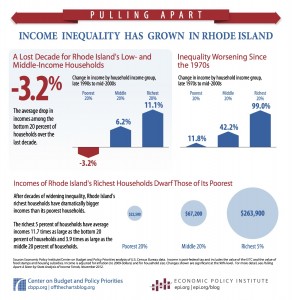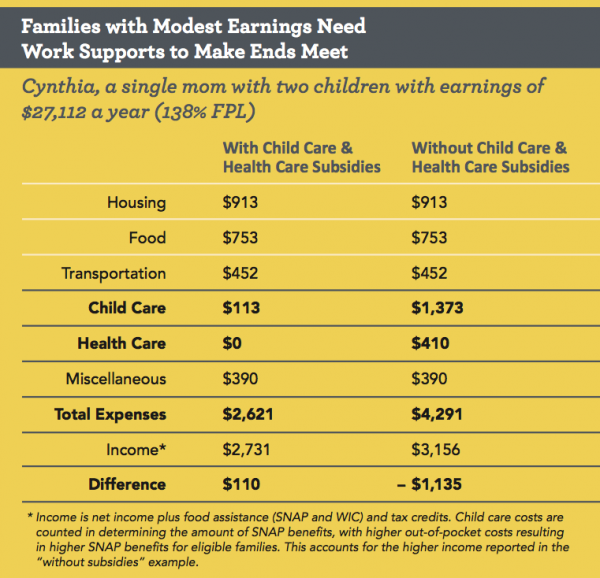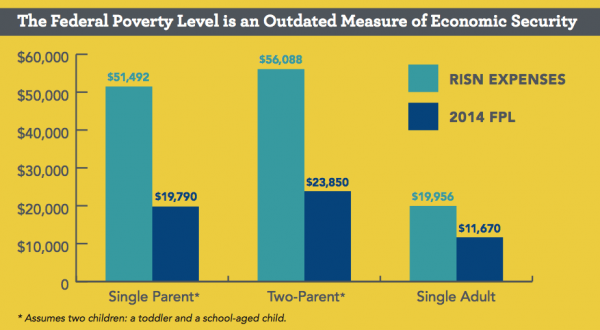Voting against the increase were Republicans Nick Kettle, of Coventry, Mark Gee, of East Greenwich, and Elaine Morgan, of Ashaway.

A study from 2012 conducted by the Center on Budget and Policy Priorities (CBPP) showed that from the 1970’s to the mid-2000s, the income gap has grown 70 percent. The poorest 20 percent of Rhode Islanders have only received a 11.8 percent raise in their household incomes, while the richest 20 percent have seen their income grow 99 percent.
In Connecticut and Massachusetts, the percentages are even more disconcerting. The poorest 20 percent of MA residents have seen no change in their income since the 1970s, but the richest 20 percent have had a 151.9 percent increase. Connecticut’s poorest residents have even seen a drop in their income by 4 percent since the 1970s, and a 9.8 percent drop in the past decade, more than both Rhode Island and Massachusetts.
How did this even happen? Kate Brewster, the executive director of the Economic Progress Institute, believes that trends have lead to the widening income gap.
“Our economy has shifted so dramatically,” she said. Brewster stated that over the years, Rhode Island has seen a move from the manufacturing to the service industry, as well as a decline in unionization among employees. These factors have lead to a decline in the minimum wage’s value.
Senator Erin Lynch (D-District 31), the sponsor of the legislation, said the move to $9.60 is a step in the right direction, even though she originally wanted $10.10.
“I would have loved for it to be $10.10,” she said. “I think any step forward is a good step forward.”
Lynch also added that even though raising the minimum wage is definitely a part of eliminating income inequality, it’s not the only piece of the puzzle.
“We want to continue moving in the direction we’re moving. There’s no one magic bullet. We’re working on all kinds of different things.”

Other pieces of the economic puzzle include workforce development, access to capital, and education. Lynch believes that those together can help to level out incomes in the state, especially because they will be able to help those who are providing for their families. Outside of the state house, Lynch works as a divorce lawyer, and sees the hardships that low wages can take on the family unit.
“I see a lot of parents. I see a lot of people getting second and third jobs. People are doing what they need to do to support their families,” she said.
Currently, Rhode Island has one of the highest minimum wages in the country, but will soon fall behind states like Massachusetts, California, and Washington, DC, as they move their wages upwards of $10 an hour going into 2016.
“An adult needs close to $12 to meet their basic needs,” Brewster said. “$10.10 would have been great, but $9.60 is better than $9.”
Lynch stated that she will continue working to move the state economy forward. Hopefully that means a brighter, more equal future for everyone in Rhode Island.
“This is home,” Lynch said. “We want to make it the best place it can be.”
]]>READ THE FULL 2014 EPI “RHODE ISLAND STANDARD OF NEED” REPORT HERE
A Rhode Islander with no children needs to earn $11.86 hourly – almost $3 more than what the state minimum wage will increase to next year – in order to afford “a no-frills budget that includes the costs of housing, food, transportation, health care, child care and other necessities such as clothing, toiletries and telephone service,” according to the new report. About 36 percent of single adults in the Ocean State earn less than this $24,666 annual threshold, according to the new EPI report.
A two parent family with two young children would need to earn $30 an hour to make ends meet, says the report. In other words, if each parent worked 60 hours a week at a minimum wage job the family would still fall about $3 an hour short of making ends meet.
According to the report, only 27 percent of all jobs in Rhode Island pay enough for a family with two children to survive on. “Child care and health care subsidies, tax credits, and nutrition assistance make a significant difference for families when wages aren’t enough,” it reads.
“Rhode Island is a beautiful state with sandy beaches, world class restaurants, and a vibrant arts and culture scene,” according to the report. “Yet many workers in our state struggle just to pay for the basics, making it all but impossible for them to enjoy all that our state has to offer. In fact, many workers would not be able to get by if not for government funded work and income supports that help close the gap between earnings and expenses.”
The report, it says, “demonstrates how work supports like food assistance, tax credits and child care and health care subsidies help close the gap between income and basic expenses.”
It uses the hypothetical example of a local bank teller to do so:
“Cynthia is a single mom of eight-year old Sam and Emma, aged two and a half. Cynthia works as a bank teller and has annual earnings of $27,112. The health insurance offered through Cynthia’s employer is unaffordable, but fortunately she is able to enroll her family in RIte Care Health Insurance at no cost. She also quali- fies for help paying for full-time care for Emma and after-school care for Sam which together costs $1373 each month. Based on her income, Cynthia’s co-pay through the Child Care Assistance program is $113/month. Without these child care and health care subsidies, Cynthia’s basic-needs budget would be in the red $1,135 every month. With these subsidies, Cynthia is able to meet her basic expenses with $110 left over.”
 The EPI report stresses that the Federal Poverty Level is no longer an accurate barometer of poverty.
The EPI report stresses that the Federal Poverty Level is no longer an accurate barometer of poverty.
READ THE FULL 2014 EPI “RHODE ISLAND STANDARD OF NEED” REPORT HERE
]]>
